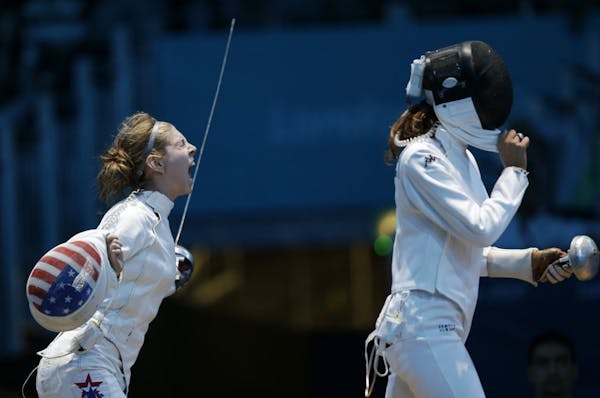LONDON - He bent at the starting line, and for a moment you could not say for sure where the blocks ended and the man began. Oscar Pistorius sprang forward on the carbon-fiber blades that have made his running career possible and provocative, and cheers from the Olympic Stadium crowd followed him like a slow-rolling wave.
Pistorius, the South American sprinter known as the Blade Runner, was warming up for the first heat of the 400 meters. He was about to become the first double amputee to compete in the Olympics. The immense crowd rained down affection upon him, one fan even shouting, "You sexy beauty!"
In cruising to second place in the heat, qualifying for Sunday's semifinals, Pistorius became an inspiration and inspired debate over his right to race in the Games.
Never before has an Olympic official excused an athlete's tardiness after a race by saying, "He's changing his legs."
"My mother always said a loser isn't the person who gets involved and comes in last," Pistorius said. "It's the person who doesn't get involved in the first place."
Born without fibulae, Pistorius had both legs amputated below the knee before turning 1. After injuring his knee playing rugby, he turned to track. That a double amputee could qualify for the Olympics is heartwarming and admirable. It is also not as simple a story as so many would like to make it.
You can be a hero and a questionable precedent, all in one. Pistorius has the ability to make us surge to our feet, and scratch our heads.
You can celebrate the man's perseverance and bravery and still question his right to race. Michael Johnson, the world record holder in the 400 meters and a friend, says Pistorius possesses an unfair advantage. Some scientists and track experts agree.
There is nothing simple about this debate, once you move past simple admiration. Sports Illustrated consulted experts who found that Pistorius' prosthetics slow him down at the start, when the blades rob him of the ability to stay low, but give him an advantage over the last 200 meters, because the blades are lighter and allow him to swing his legs at a faster rate than able-bodied runners.
Even this portion of the debate is complicated. Of the eight scientists surveyed by Sports Illustrated, four determined that the blades give Pistorius an unfair advantage and four said they weren't yet sure how to balance his various advantages and disadvantages.
Few have debated one obvious advantage: Pistorius never has to deal with lower-leg cramps, sprains or strains, much less blisters or injured toes or torn Achilles. Offsetting that is the fact that he has been forced to train his body to function in a way alien to his competitors.
"That is hard for a lot of people to take and to understand when you are talking about an athlete and an individual who has a disability," Johnson said. "It is a great story, he is a great individual and he has been a great ambassador for athletes with a disability and for people, and how to overcome [that] and continue to strive.
"Oscar sees no limits; he has no fear when competing against able-bodied athletes. So it is hard for people to understand and to accept when you start to talk about whether or not he may have the advantage."
Saturday, at least, the debates didn't matter much, not while Pistorius was cruising around the sunlit track. His fellow competitors expressed admiration for him, and Pistorius, who thanked everyone from his coaches to his competitors to the media packed around him in the interview zone, said, "It's moments like this that make you step back and say, 'Wow!'"
For the moment, Pistorius fits perfectly into the Olympic dialogue. He is admirable but unthreatening. He will inspire, but he is unlikely to medal.
"He created history," said Grenada's Kirani James. "I have a lot of respect for him."
But how would Pistorius be regarded if, instead of finishing second in a heat that would otherwise be ignored, he were threatening Johnson's records on feet of carbon?
"That," James said, "is another story."
Jim Souhan can be heard Sundays from 10 a.m. to noon and weekdays at 2 p.m. on 1500-AM. His Twitter name is SouhanStrib. • jsouhan@startribune.com

Souhan: Why Tiger Woods should keep swinging
Souhan: Scheffler wins Masters again, shows what makes him special
Morikawa falters in final round at Masters

Keeping up with the Joneses who helped design Augusta National's classic back nine


